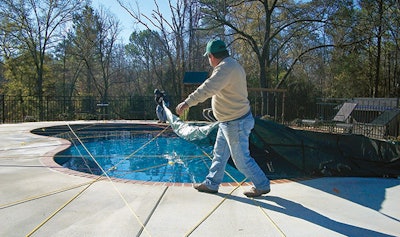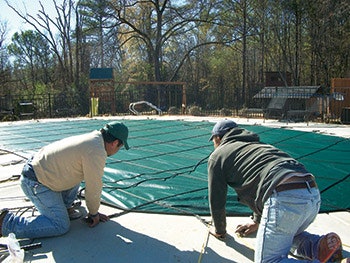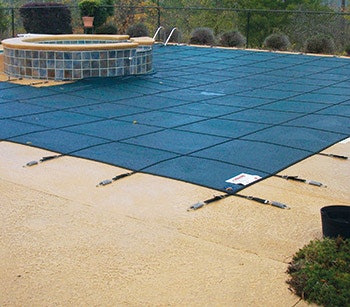
A safety cover sale is a great way to literally cap off a good pool season. And while less than 30 percent of pools have this essential piece of equipment, safety covers are gaining popularity among customers thanks to greater awareness of the benefits they provide. But every vendor has a strategy based on the local clientele. Here, we spoke to a few successful cover dealers across the country for their take on winter cover sales.
Safe, Not Sorry
Believe it or not, there was once a time when salespeople shied away from the safety aspect of pool ownership because they didn’t want to alarm clients or suggest that pools weren’t safe. Nowadays we focus on safety as a way of reassuring customers, knowing they seek the affirmation that comes from solid products and diligent, sensible safety practices.
Tackling the issue head-on is Lisa Newton, owner of Splash Pool and Spa Service in Wenatchee, Wash. Far from soft-pedaling safety, it’s the central component of her pool cover sales strategy.
As Splash is an on-site service company with no retail front, Newton’s winter cover sales happen at the customer’s home. “If I go to a job, I’m making a mental note of the stuff they may need,” she says. First on that list: a winter safety cover. Newton’s dedication to the product accounts for why she estimates that out of her 150 customers, only a few are without a cover — but not for long.

“If they don’t have one, they’ll end up with one,” she says.
The key to her success is taking a personalized approach to the safety features a winter cover offers. She lays it out to her customers in simple terms: “You got kids? You need a safety cover. You’ve got grandkids? You need a safety cover. You got animals? You need a safety cover. Do you go on long vacations and leave your pool unattended? Don’t think a fence is going to hold out the neighbors. You need a safety cover.”
While safety drives her cover sales, there is one important caveat.
“I never use the word ‘drown,’” she says. “I have a hard time even saying it. But all I really need to say is ‘safety:’ your children, your grandchildren, your dogs, everybody gets the idea.”
Once a customer has expressed interest in a safety cover, Newton’s next step is to write a proposal. Each proposal is personalized for the customer, with a list of bullet points that explain how a safety cover would benefit them. For example, parents will see a line about how a cover will keep their kids safe. Dog owners will see a line about protecting their pets. And those who live in a high-wind area may see a bullet point about seeing less debris in their pool in the spring.
A pamphlet from a safety cover manufacturer is also attached to each proposal to show what a cover looks like and explain the level of quality inherent in the product.
“Using the brochures, I think the covers kind of sell themselves,” Newton says. “A lot of times, that’s all I’ll do: Just give them the brochure and we might talk a little bit, but I won’t go on and on. Or I’ll send out my proposal, because that with the brochure just sells it.”
When meeting with a customer who’s never had a pool before, Newton takes special care to discuss the value of a safety cover.
“They don’t know any different. And to be honest, they’re trusting me a lot,” she says.
“I take all the pools we take care of personally. I tell people I try to treat it as if it were my own, and I’m serious. I strongly believe in the safety factor of winter pool covers.”

The Doctor Is In
Communicating a strong sense of personal responsibility and integrity is also the stock-in-trade of Jeff Knapp, owner of The Pool Doctor, a mom-and-pop service/retail/construction business in Piedmont, Ala. His winter pool cover sales (and really every aspect of his business) come down to one philosophy: being blunt and honest.
“We’re looking at building a good relationship. And when customers really get to understand my personality, they go, ‘Hey, this guy is shooting us straight. He’s not trying to make a sale, he’s not getting rich, he’s really telling us what his opinion is and what he would do in his own residence.’”
The Pool Doctor’s warm southern climate and rural customer base mean that customers often keep their pools open year-round and are sensitive to cost. For these reasons, they tend to opt for tarp covers. And that’s why most of his winter cover customers approach him first about the subject — largely out of frustration from the debris tarp covers allow.
“They’ll start complaining about opening the pool and all the debris that’s in there. So we talk to them about it and say, ‘You know, there’s another option.’ And they start thinking about it and go, ‘You know, I never want to deal with this again.’”
Of course, the sticker price is an obstacle, but with a simple explanation of the economic realities of the situation, customers usually see the light.
“They start talking about how much money they spend on tarps. Although the tarp covers have a 15-year warranty or an 8-year warranty, they don’t last through the season. So we tell them, ‘Look, we don’t go out and install these tarp covers, and this is the reason. If you want to purchase them from our retail store, we have them in the fall. But we’re not your guy that’s just going to throw something on your pool and try to make a quick dollar.”
In short, like Newton, Knapp takes a benefit-focused approach to his winter pool cover sales, often throwing in some words about the aesthetic appeal of quality covers over tarps. About his covers, Jeff says, ‘This looks nice. You’re looking out your back door in the wintertime, you can’t get outside, it’s nasty looking out there, but wow, that cover sure looks nice.’”
And with luck, that satisfaction proves infectious.
“Anything that can help the customer and make it easier for them to enjoy their swimming pool will make someone else is want what they have.”
True Stories
It’s that good-natured admiration for what someone else has that works to push cover sales for True Blue Swimming Pools, in Dix Hills, N.Y. Michael Truehart, president, says his company builds about 80 pools for year, and roughly 75 percent of his clients have winter safety covers. He notes this is partially because his area is more affluent — and in an area with more pools, word-of-mouth is common.
“When somebody decides to purchase a pool, they speak to all of their friends and neighbors who have pools and get a little bit of information from each one,” Truehart says. “And certainly one of the things that comes up in that conversation is, ‘What do you do in the winter?’”
But while the word-of-mouth is helpful, Truehart says misconceptions are also likely to spread. However, such concerns are easily resolved by explaining the advancements in cover technology.
“The way covers fit on raised wall treatments or waterfall treatments has gotten much better,” he says. “That used to be a concern for people: that when you put a cover next to a waterfall, it left some gaps that was a safety concern or a spot where leaves might fall in. But that technology has certainly improved.”
Another concern that spreads among potential customers: more challenging cleanup during the opening season. When encountering such concerns, Truehart again speaks to technological advancements, namely a tighter mesh material that blocks most of the sunlight to keep pools cleaner.
“You have to set people’s expectations,” Truehart says. We tell all of our customers that when you have a safety cover, open the pool early. ‘Don’t think you’re going to take the cover off and start swimming in it two days later.’”
While safety is indeed important to a winter cover sale, Truehart says appearances are equally important to his customers.
“A lot of our families have older children, so it may not be a safety issue — they just don’t want to look at the tarp out their kitchen window for seven months,” he says.
As a builder, Truehart says it’s common for customers to assume they’ll get a winter safety cover, whether it’s included in the contract or as an after-market sale.
“It’s not a hard thing to sell. Most people, when they call you, they already know they want it. It’s just a matter of negotiating the cost and explaining the features to them.”
The Language of Safety
When talking about safety, here’s what Michael Truehart suggests:
Very careful word choice. “We like to use the word ‘safer.’ Not ‘safe,’ but ‘safer.’”
A good pitch. “The safety cover is ‘seven months worth of peace of mind.’”
Putting it in context. “There are many levels of safety for a pool — there are fences, pool alarms, door alarms in the house. Those are all great safety features, but none of them will prevent a child from having an accident in the pool. When that safety cover is on the pool, that pool is 100 percent safe.”
Comments or thoughts on this article? Please e-mail [email protected].












































